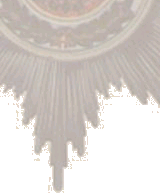|
(Published in Orden
Militaria Magazin No.60 of the German Order Collector
Society; BDOS e.V.)
Prinz Albert of
Sachsen-Coburg-Gotha was looking for a wife in late
1836. Because of the help of the Prinz Leopold von
Sachsen-Coburg-Saalfeld, his way lead him to crown
princess Victoria of England. Unfortunately Victoria
kept distance between herself and her poor cousin.
During his journey he awarded some
people with different orders and medals. Captain Thomas
Baldock was also awarded with such an order.
Looking him up in the "Adress-Handbuch
des Herzogthums Sachsen Coburg und Gotha" for the year
1837, proofs the awarding to Th. Baldock. It is written
there: "1836. Octbr. Königlich Großbritanischer
Marine-Captain Baldock". This was in general the 27.
awarding of a knight cross and the 14. awarding of a
knights cross for a foreigner.
It wouldn't be something unusual.
Normally an awarding to foreigners are more often then
to citizens. There wasn't normally a difference between
a decoration for foreigner then for citizen. The
Princely-Saxon House Order of Ernestine for foreigner is
exceptional. For foreigners was a special style made.
The statutes from 1833 made a clear difference between
both cases: "Die an Ausländer zu verleihenden
Ordenskreuze haben keinen Eichenkranz um den blauen
Ring. (Foreigners are getting decorations without the
oak leaf surrounding the motto band)". The example shown
is such a piece. The oak leaf wreath wasn't only missing
so that the medallion would have been smaller then the
normal medallions. A special medallion was extra made in
case a piece was awarded to a foreigner.
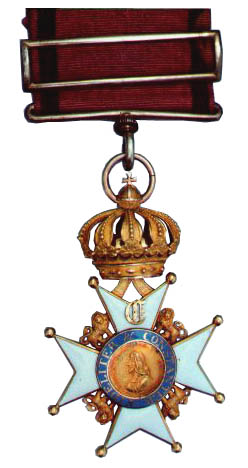
for foreigner |
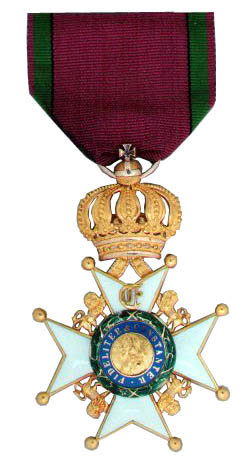
for citizens |
The discriminative style, from
today's point of view, of this order was deleted in 1864
(unofficially round 1856).
The fact that Captain Baldock was
very proud of his House Order, is proven by the
miniature he bought. He hasn't worn it, as common in
this time, on a barrette, but as a single piece on a
golden needle. The miniature shows as the original
knights cross the "E" (Ernst von Sachsen-Coburg-Gotha)
and has the special medallion with the missing oak leaf
wreath.
.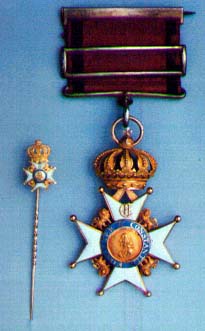
So it was
written in Orden Militaria Magazin No.60. Yet a good
friend of mine passed the following document on to me:
It clearly states that Captain
Baldock was awarded the Ernestine House Order Knight
Cross 1st Class for Foreigners on September 20, 1836.
Well after the above written theory. The document also
shows the actual reason for the award of this order
decoration. He was awarded the decoration for of courage
in preventing some danger from Prince Ferdinand.
© A.
Schulze Ising, II/99
Since a few pieces of extreme rarity
came up for auction it is prudent to update this section
with some imagery: Following
is a first type for foreigners awarded from more then one
of the three houses: 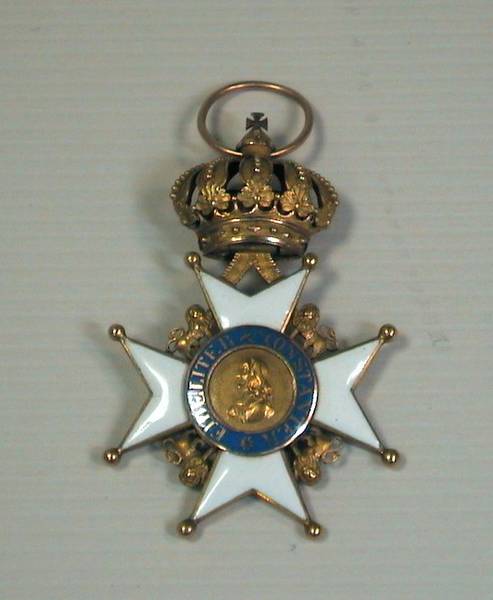
Obviously
the letter on the upper cross arm is missing that would
normally indicate the principality awarded the decoration.
Awards granted by Prince Friedrich of Saxe-Altenburg would
show an "F", those awarded by Prince Bernhard of
Saxe-Meinigen a "B" and those made by Prince
Ernst of Saxe-Coburg-Gotha an "E". Based on
observations of market activities over the past decades it
becomes evident that the Coburg Gotha pieces are the more
common ones, while pieces with "F" or "B'
almost never surface. Next a recently
auctioned knight cross awarded by the Meiningen house: 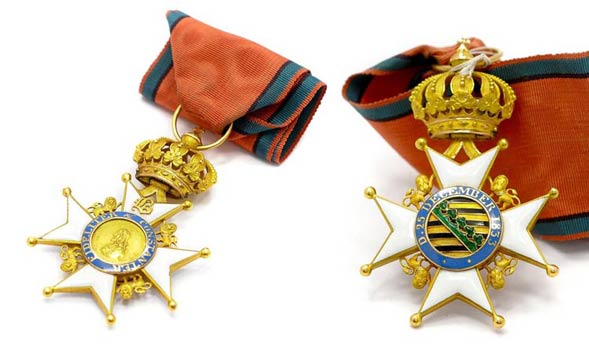
© A.
Schulze Ising, VIII/11 | 

